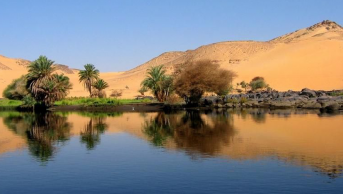Revisiting OECD’s Water Principles: An Integral Guide for Management of Middle Eastern Waters?

A study by the Organization for Economic Co-operation and Development (OECD) defined a comprehensive list of core principles for a better water governance, which can be a significant guide in helping Middle East countries regarding their challenges of water and climate change. It should be noted though, for these principles to become operational realities, contextual factors of the region-such as stability and good governance in general- must be enhanced first.
Established in 1961, the OECD aims to support“policies that will improve the economic and social well-being of people around the world”. The Organization has currently 34 Members. There has been a vast publishing record developed by the OECD. As a serious common challenge of humanity, water has numerously been one of the main foci of OECD studies. “OECD Principles of Water Governance” is a recent contribution in that regard.
First and foremost, it is critical to find and implement context-oriented solutions. Based on the evidence including stories of success and failure, OECD experts rightfully argue that “there is not a one-size-fits-all solution to water challenges worldwide, but rather a large diversity of situations within and across countries. Governance responses should therefore be adapted to territorial specificities, and recognising that governance is highly context-dependent and important to fit water policies to places.”
There are three interlinked and mutually reinforcing dimensions of water governance, according to Study. These are effectiveness,efficiency. and trust and engagement. Effectiveness “relates to the contribution of governance to define clear sustainable water policy goals and targets at all levels of government, to implement those policy goals, and to meet expected targets” while efficiency “relates to the contribution of governance to maximise the benefits of sustainable water management and welfare at the least cost to society”. Finally, trust and engagement “relate to the contribution of governance to building public confidence and ensuringinclusiveness of stakeholders through democratic legitimacy and fairness for society at large".
It is worth quoting at length the concise water governance principles of OECD before briefly discussing their relevance and chance for implementation in the Middle East: Principle 1. Clearly allocate and distinguish roles and responsibilities for water policymaking, policy implementation, operational management and regulation, and foster co-ordination across these responsible authorities. Principle 2. Manage water at the appropriate scale(s) within integrated basin governance systems to reflect local conditions, and foster co-ordination between the different scales.. Principle 3. Encourage policy coherence through effective cross-sectoral co-ordination, especially between policies for water and the environment, health, energy, agriculture, industry, spatial planning and land use. Principle 4. Adapt the level of capacity of responsible authorities to the complexity of water challenges to be met, and to the set of competencies required to carry out their duties. Principle 5. Produce, update, and share timely, consistent, comparable and policy-relevant water and water-related data and information, and use it to guide, assess and improve water policy. Principle 6. Ensure that governance arrangements help mobilise water finance and allocate financial resources in an efficient, transparent and timely manner. Principle 7. Ensure that sound water management regulatory frameworks are effectively implemented and enforced in pursuit of the public interest. Principle 8. Promote the adoption and implementation of innovative water governance practices across responsible authorities, levels of government and relevant stakeholders. Principle 9. Mainstream integrity and transparency practices across water policies, water institutions and water governance frameworks for greater accountability and trust in decision-making. Principle 10. Promote stakeholder engagement for informed and outcome-oriented contributions to water policy design and implementation. Principle 11. Encourage water governance frameworks that help manage trade-offs across water users, rural and urban areas, and generations. Principle 12. Promote regular monitoring and evaluation of water policy and governance where appropriate, share the results with the public and make adjustments when needed.
Water governance principles of the OECD present a complete coverage of water problems associated with “governance” issues. The OECD study carefully notes that “the Principles are rooted in broader principles of good governance: legitimacy, transparency, accountability, human rights, rule of law and inclusiveness.” This point is extremely relevant to Middle East since the region at large suffers from lack of good governance practices, which renders attainment of the good “water” governance quite difficult. Legitimacy of many governments are undermined due -inter alia- to discriminatory treatment to minorities, rampant human rights violations, disrespect of rule of law, and blemished elections.
Having considered such prerequisites of water governance principles set out by the OECD study, then, one may draw notable lessonsfor the Middle East, albeit risk of generalization exists to some extent, since contextual factors vary significantly across countries, and even across regions of the countries. Yet, commonalities enable us to reach a conclusion with confidence that there are problems in varying degrees in all these criteria listed above throughout the Middle East. Finally, the criterion of “stability” in form of an effective state control which does not exist in substantial territories in the Middle East, should also be added as an essential criterion of some kind of “governance”.









